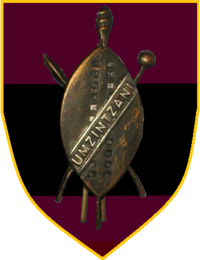Prince Alfred's Guard
| Prince Alfred's Guard | |
|---|---|

SANDF Prince Alfreds Guards emblem
|
|
| Active | 19 September 1856 to present |
| Country |
|
| Allegiance | |
| Branch | |
| Type | Light Infantry |
| Size | One battalion |
| Part of |
South African Infantry Formation Army Conventional Reserve |
| Garrison/HQ | Port Elizabeth |
| Motto(s) | Fidelis et Fortis (Faithful and Brave) |
| Anniversaries | 19 September (Regimental Day) |
| Equipment | Eland Mk7 (formerly) |
| Engagements | South African Border War |
| Battle honours |
|
| Commanders | |
| Current commander |
Lt Col Cyril Masangwana |
| Insignia | |
| Company level Inisgnia |  |
| SA Motorised Infantry beret bar circa 1992 | |
Prince Alfred's Guard (PAG) is an infantry regiment of the South African Army. As a reserve unit, it has a status roughly equivalent to that of a British Army Reserve or United States Army National Guard unit. The Regiment is located in the city of Port Elizabeth.
Prince Alfred's Guard was established on 19 September 1856 as the Port Elizabeth Volunteer Rifle Corps. In 1860 the title Prince Alfred's Guard was assumed unofficially (after Prince Alfred, Duke of Edinburgh) and on 11 July 1874 this name was officially sanctioned as Prince Alfred's Volunteer Guard. The name was later changed to Prince Alfred's Guard.
The Regiment first saw action on 2 December 1877, against the Gcaleka tribesmen in the Battle of Umzintzani during the Ninth Xhosa War. The next conflict that the PAG participated in was the Basutoland Campaign of 1880 to 1881, during which a 500-metre bayonet charge by the Regiment which led to the capture of the village of Lerotholi, an enemy village. The Regiment also took part in the Bechuanaland Campaign of 1897.
The Regiment also served in the Second Anglo-Boer War of 1899 to 1902 - as mounted infantry - and took part in campaigns in the Orange Free State and the South African Republic.
Members of the PAG volunteered for service in World War I, but there was dissension in the ranks after a long deployment on sentry duty in Cape Town. As a result, the contingent was disbanded and most of its members saw active service during the war in other South African units.
...
Wikipedia

